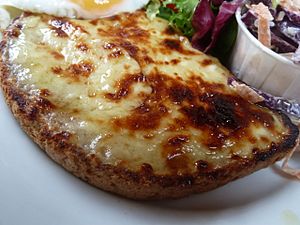Welsh rarebit facts for kids
 |
|
| Alternative names | Welsh rabbit |
|---|---|
| Type | Savoury |
| Place of origin | United Kingdom |
| Main ingredients | Cheese, bread |
| Variations | Buck Rabbit, Blushing Bunny, Hot Brown |
Welsh rabbit (also called Welsh rarebit) is a tasty dish. It's made with a hot, cheesy sauce. This sauce is poured over slices of toasted bread. The name "Welsh rabbit" was first used in the 1700s. It was a funny, joking name. Later, people changed it to "rarebit." This was because the dish doesn't actually have any rabbit meat in it.
There are also other versions of this dish. These include English rabbit, Scotch rabbit, buck rabbit, golden buck, and blushing bunny. Even though it's called "Welsh," there isn't strong proof it started in Welsh cuisine.
Contents
What is Welsh Rabbit?
Welsh rabbit is a classic dish. It's a type of cheese on toast. It's known for its rich, melted cheese sauce. This sauce makes it different from simple cheese on toast.
How is the Cheesy Sauce Made?
Some recipes for Welsh rabbit are very simple. They just involve melting grated cheese directly onto toast. This makes it similar to regular cheese on toast.
However, many recipes make a special sauce. This sauce often includes cheese mixed with ale and mustard. Sometimes, people add cayenne pepper or paprika for extra flavor. Other recipes might use wine or Worcestershire sauce. Some chefs even blend the cheese and mustard into a creamy béchamel sauce.
Different Kinds of Rabbit Dishes
In 1747, a famous cookbook writer named Hannah Glasse shared recipes for similar dishes. Her book, The Art of Cookery, included "Scotch rabbit," "Welsh rabbit," and two kinds of "English rabbit."
- Scotch rabbit: This is simple. You toast bread, butter it, then toast a slice of cheese and put it on the bread.
- Welsh rabbit: Toast bread, then toast cheese on one side. Put the cheese on the toast and brown the other side with a hot iron. You can also add mustard.
- English rabbit: Toast bread and soak it in red wine. Then, pile thin slices of cheese on top. Bake it until it's toasted and brown. Another way is to melt cheese with white wine and a little mustard in a pan. Then, pour it over the wine-soaked toast.
Buck Rabbit and Blushing Bunny
If you add a fried or poached egg on top of Welsh rarebit, it becomes a buck rabbit. It's also sometimes called a golden buck.
When Welsh rarebit is mixed with tomato (or tomato soup), it gets a pink color. This version is called a blushing bunny.
In some parts of France, like Nord-Pas-de-Calais, this dish is simply called un Welsh.
Where Did the Name Come From?
The first time "Welsh rabbit" was written down was in 1725. It was likely meant as a joke. The exact reason for the name isn't fully known.
Why "Welsh"?
The dish might have been linked to the Welsh because they were known for enjoying roasted cheese. It was a popular food in Wales.
The "Rabbit" vs. "Rarebit" Mystery
The word rarebit is actually a changed version of rabbit. The name "Welsh rabbit" came first in 1725. The word "rarebit" appeared later, in 1781. Rarebit is almost never used by itself. It's only used when talking about this specific dish.
Many people have found it funny that "Welsh rabbit" was changed to "Welsh rarebit." They point out that the original "rabbit" was a joke. For example, a famous writer named H.W. Fowler said in 1926: "Welsh Rabbit is amusing and right. Welsh Rarebit is stupid and wrong."
However, many cooking experts, especially those writing for people who don't speak English, use "rarebit." This helps them make it clear that the dish does not contain meat.
Interestingly, old English cookbooks from the 1700s show there were also "English Rabbit," "Irish Rabbit," and "Scotch Rabbit" dishes. But none of them were called "rarebit."
Welsh Rabbit in Pop Culture
Sometimes, "rarebit" or "rarebit sauce" is used as a cheese sauce. You might find it on hamburgers or other foods today.
For a long time, people believed that toasted cheese was a favorite food of the Welsh. There's an old joke from 1526 about it. It says that God was tired of all the Welshmen in Heaven. So, Saint Peter called out "roasted cheese!" All the Welshmen ran out of heaven to get it. Then, Saint Peter locked the gates, and that's why there are no Welshmen in heaven.
The Betty Crocker's Cookbook once claimed that Welsh farmers weren't allowed to eat rabbits caught on rich people's land. So, they used melted cheese instead. It also said that famous writers like Ben Jonson and Charles Dickens ate Welsh rarebit at a pub in London. But there's no real proof for these stories. In fact, Ben Jonson died almost 100 years before the term "Welsh rabbit" was even used!
Welsh rabbit is also said to cause very vivid dreams. The comic strip series Dream of the Rarebit Fiend shows characters having wild dreams after eating Welsh rarebit before bed. In an episode of Gomer Pyle, U.S.M.C., eating Welsh rarebit makes Gomer (and later Sgt. Carter) sleepwalk and act the opposite of their normal selves.
Images for kids
See also
 In Spanish: Welsh rarebit para niños
In Spanish: Welsh rarebit para niños
 | Bayard Rustin |
 | Jeannette Carter |
 | Jeremiah A. Brown |


